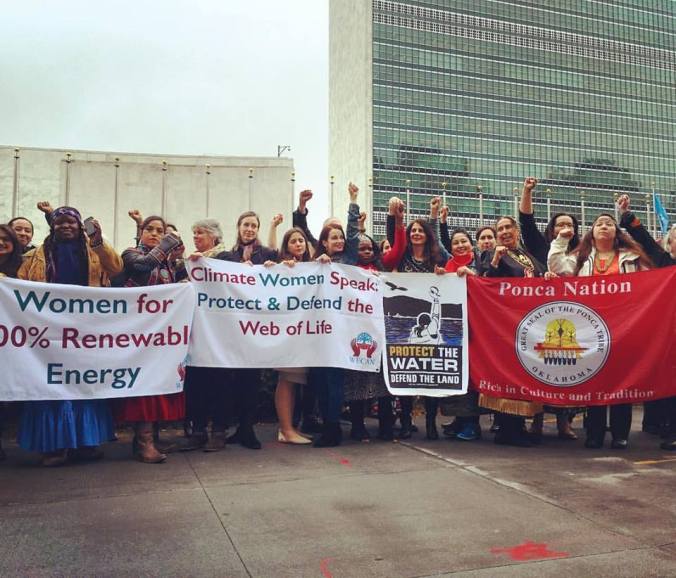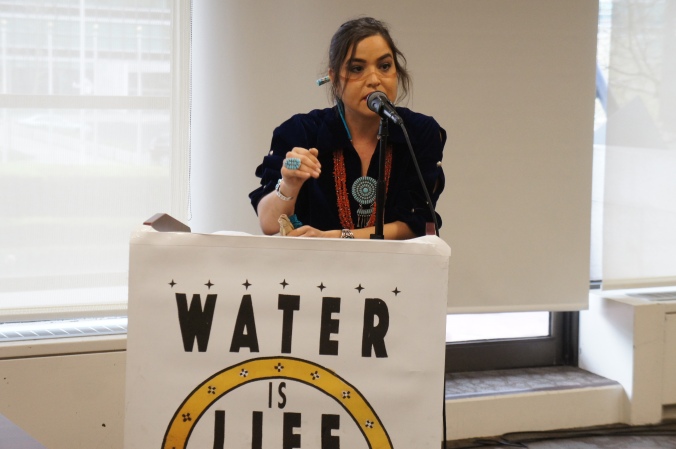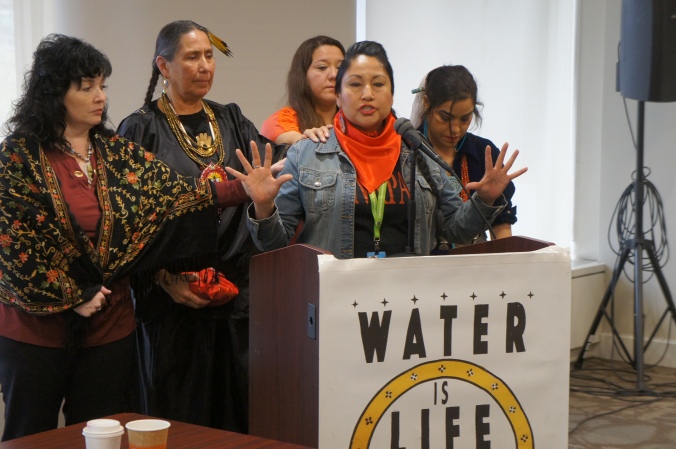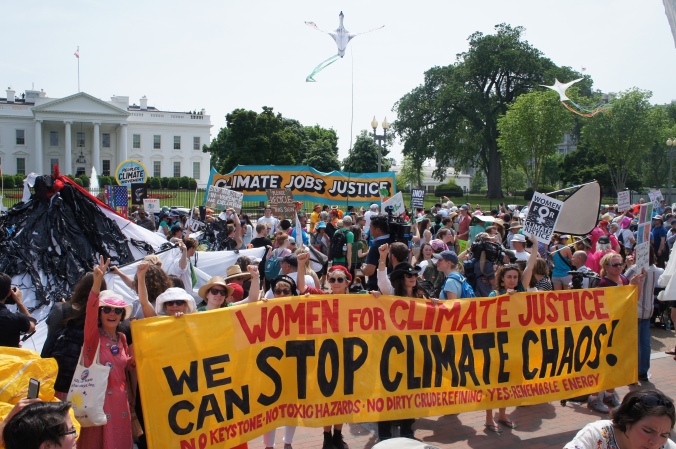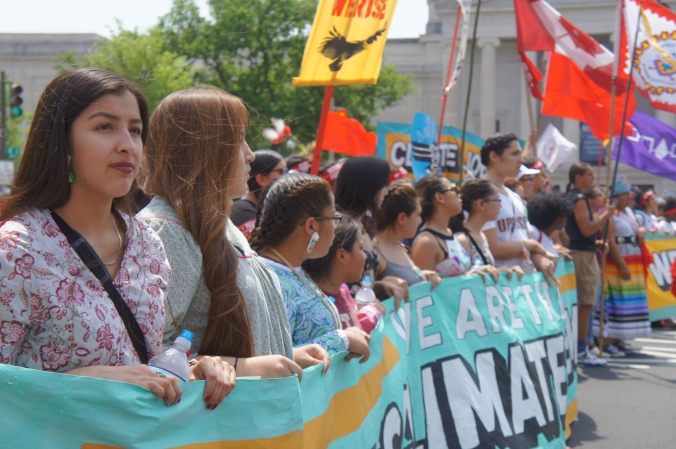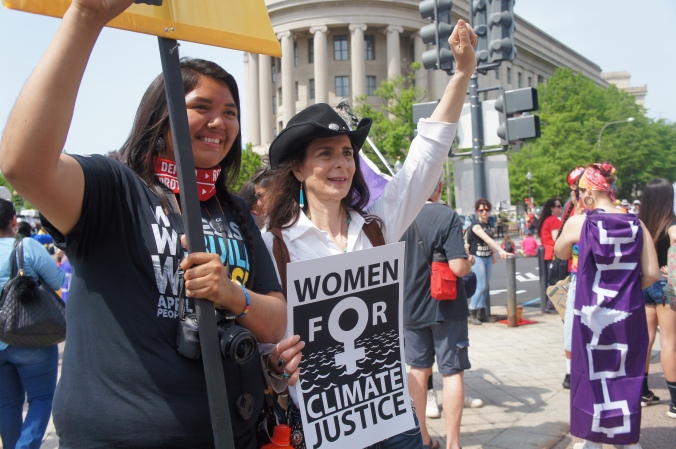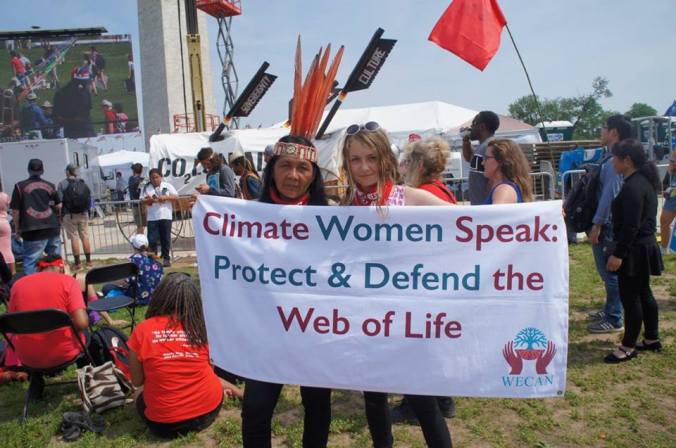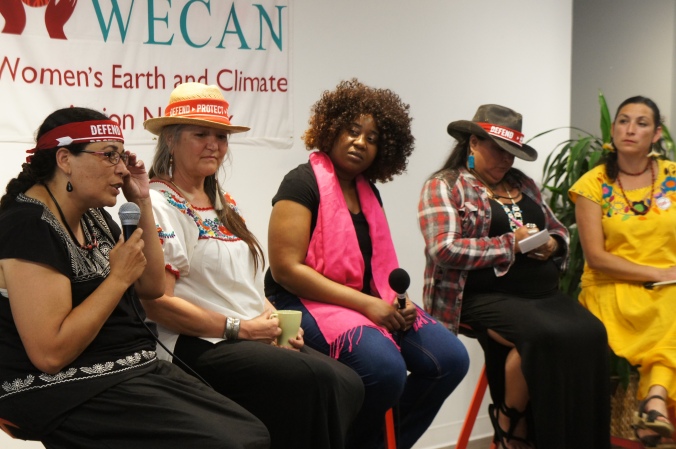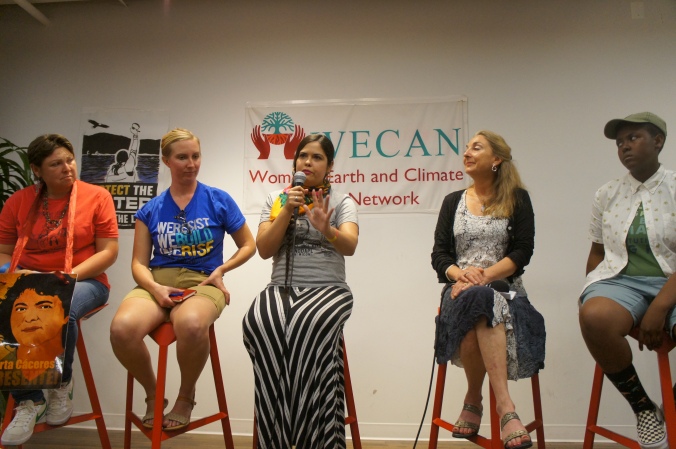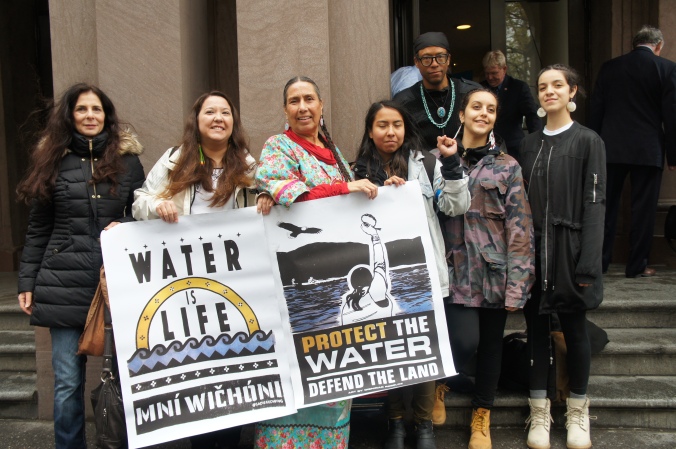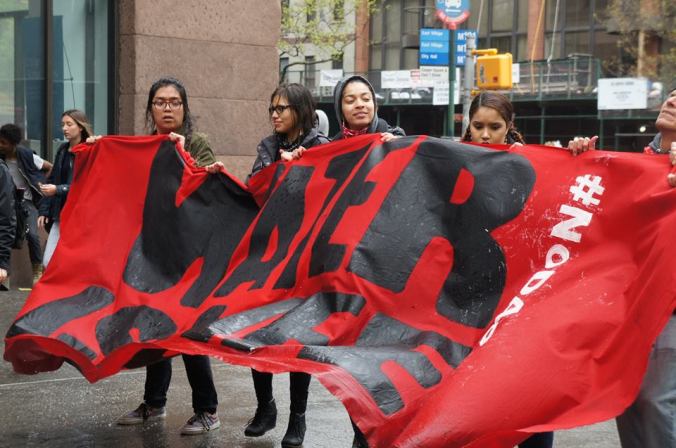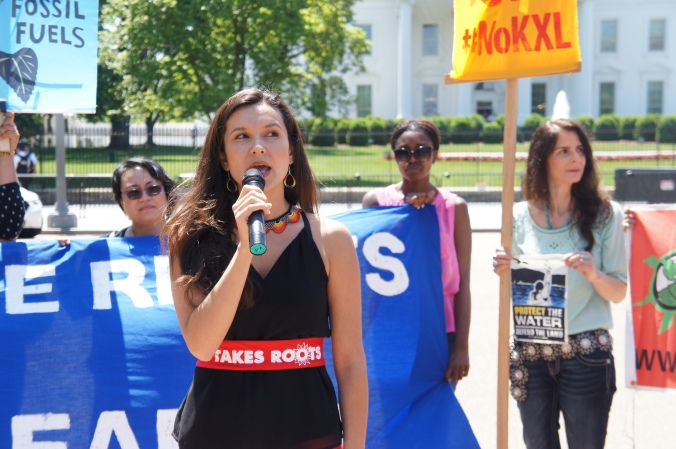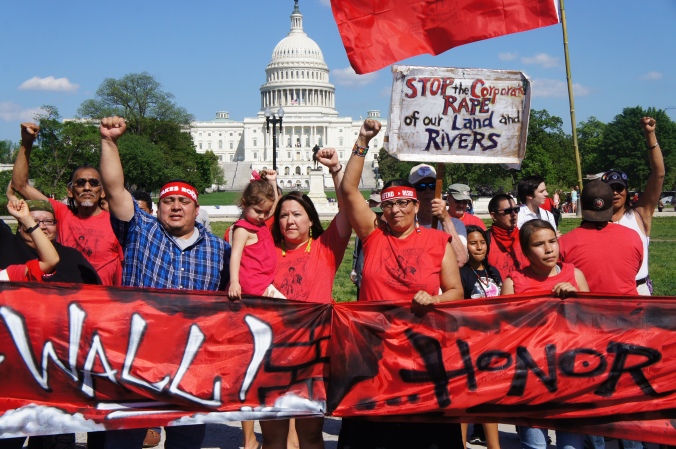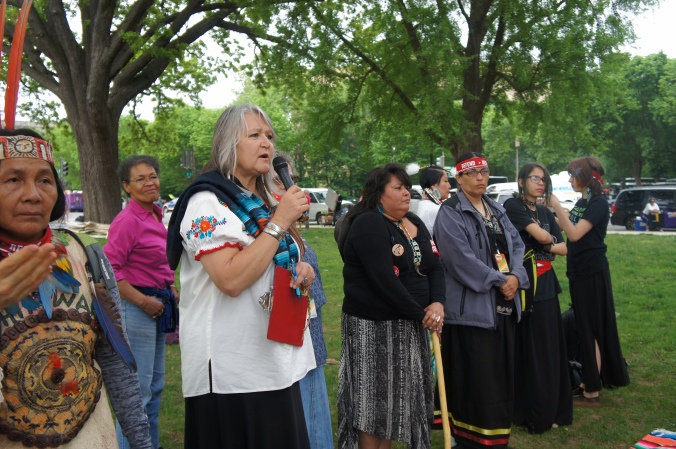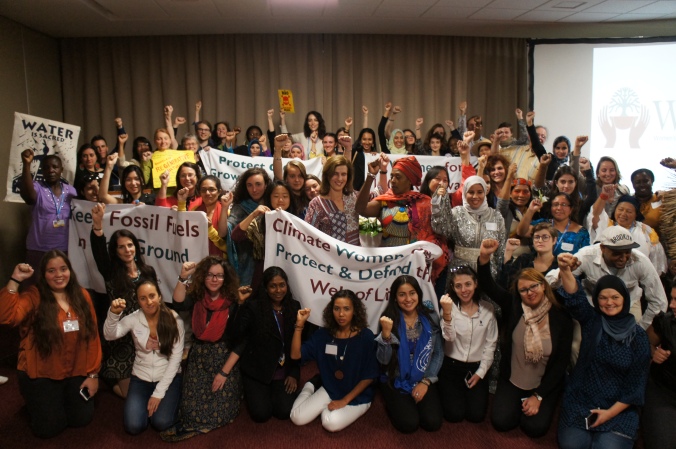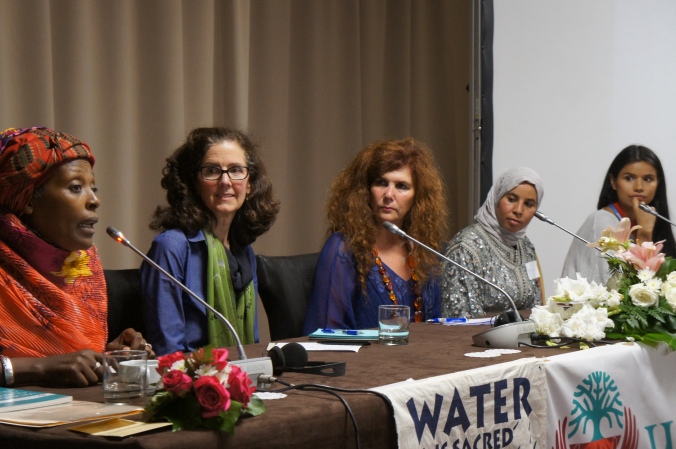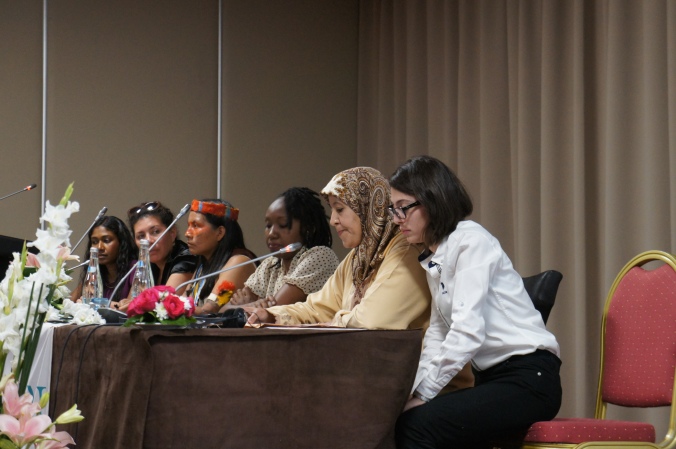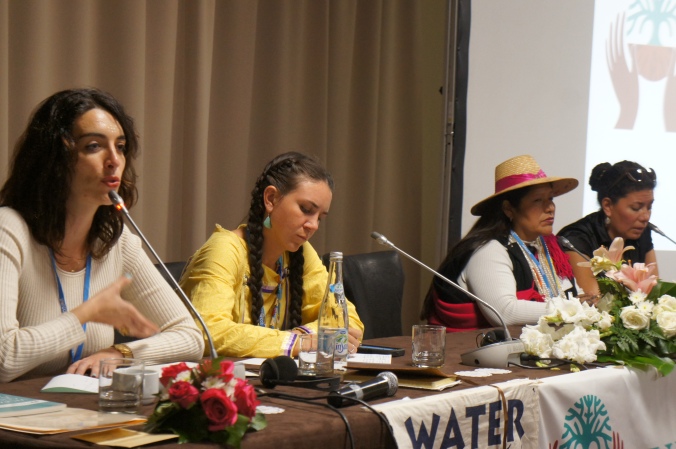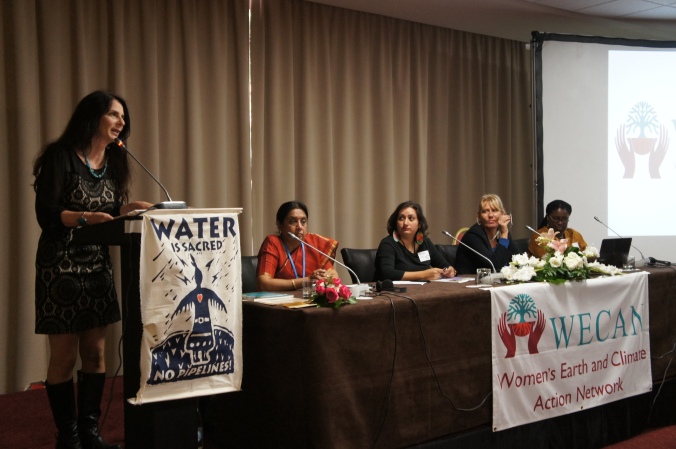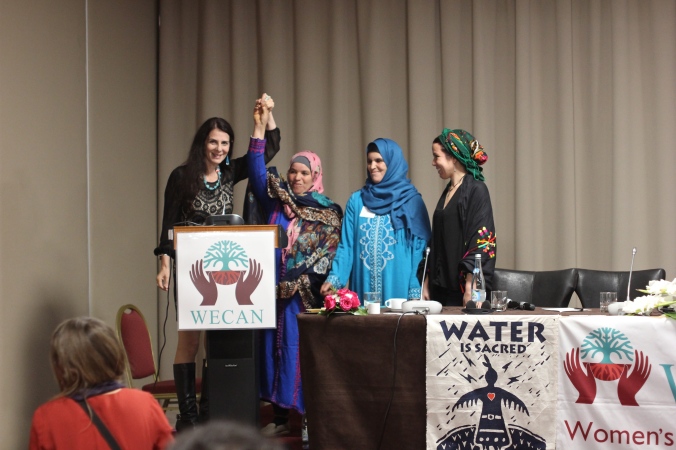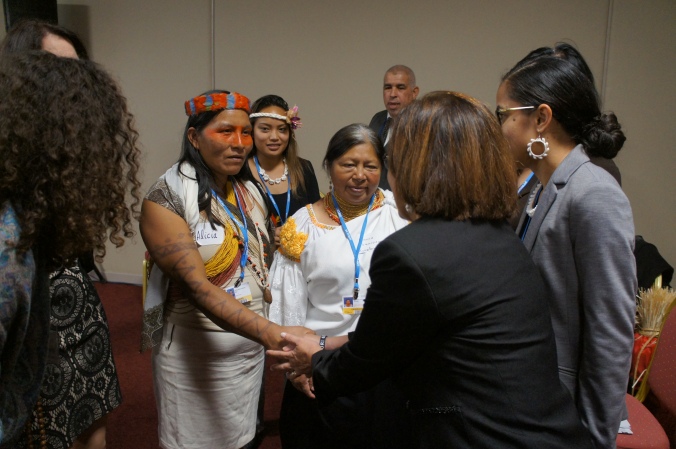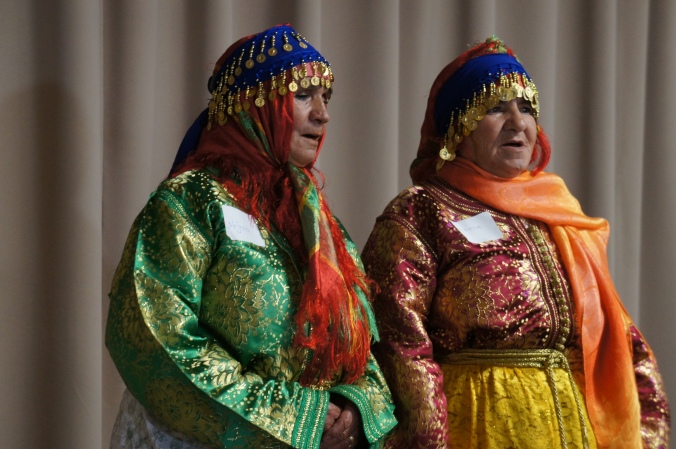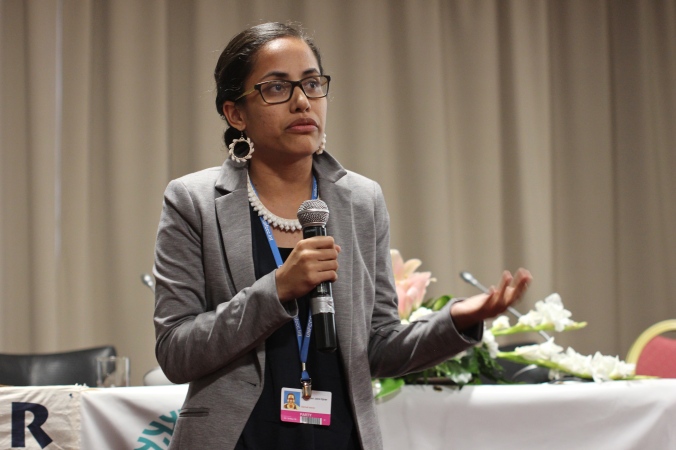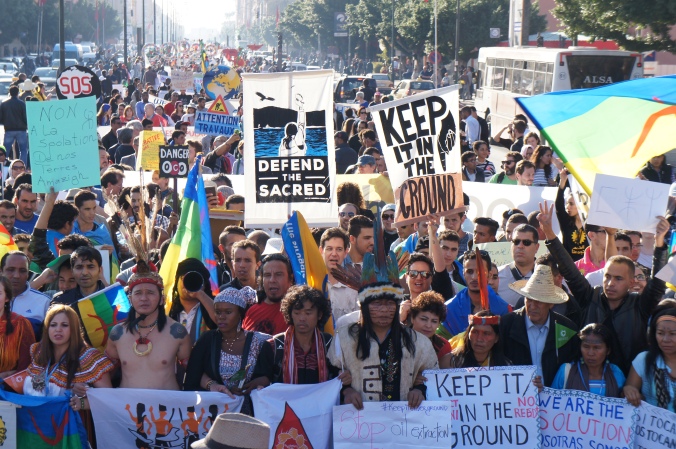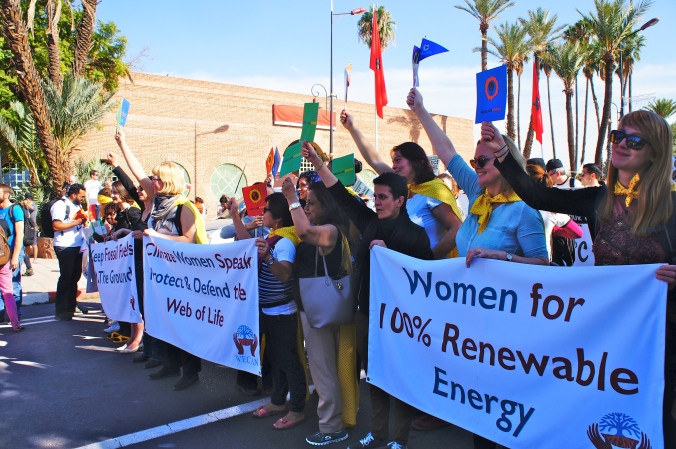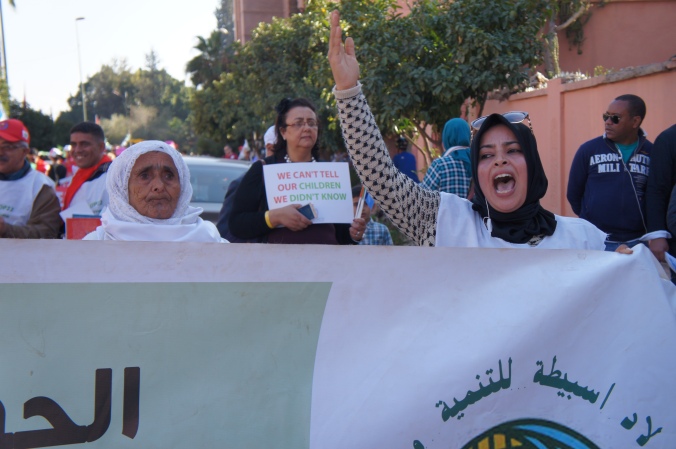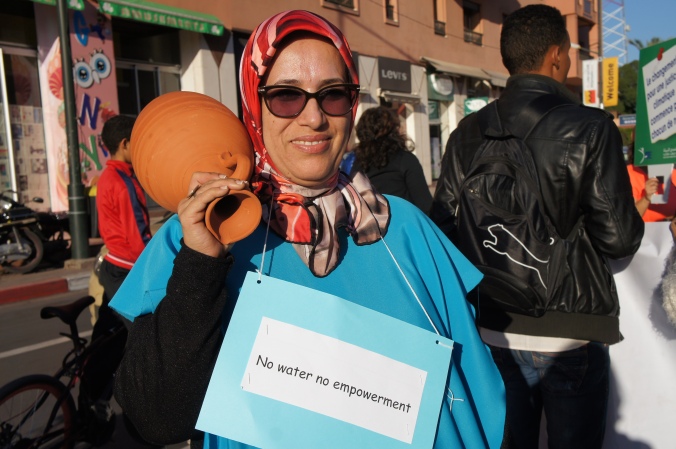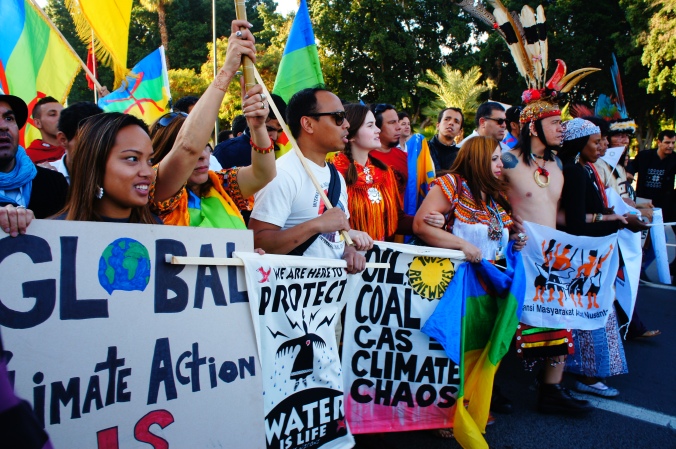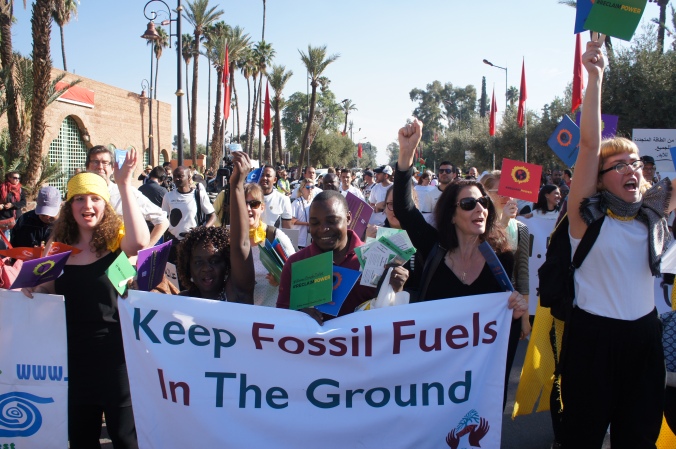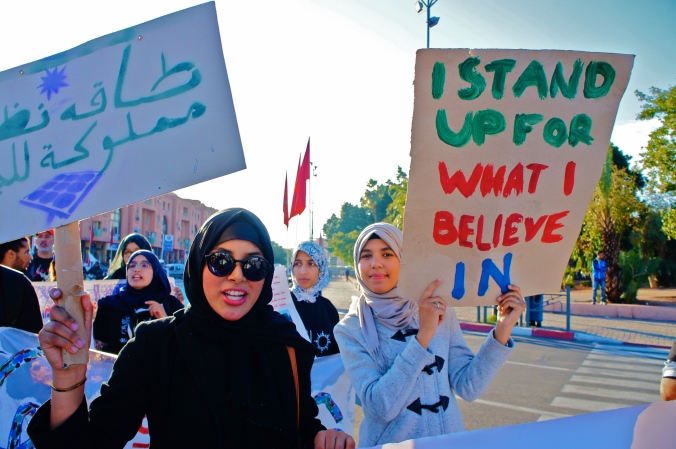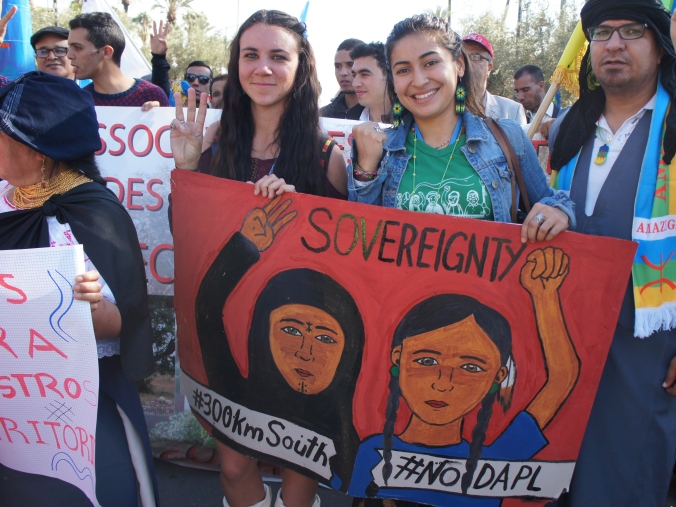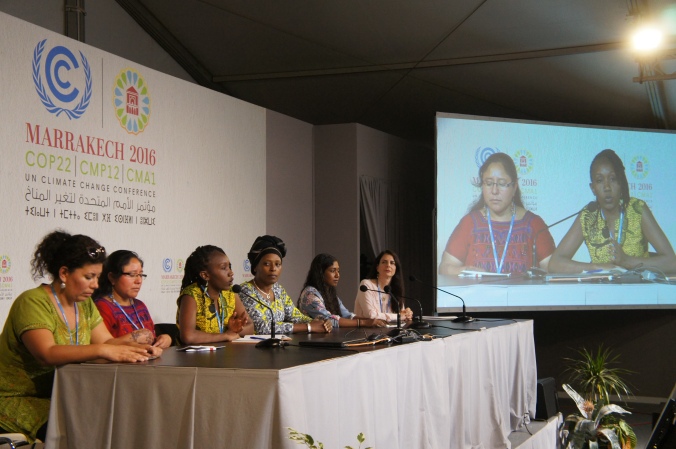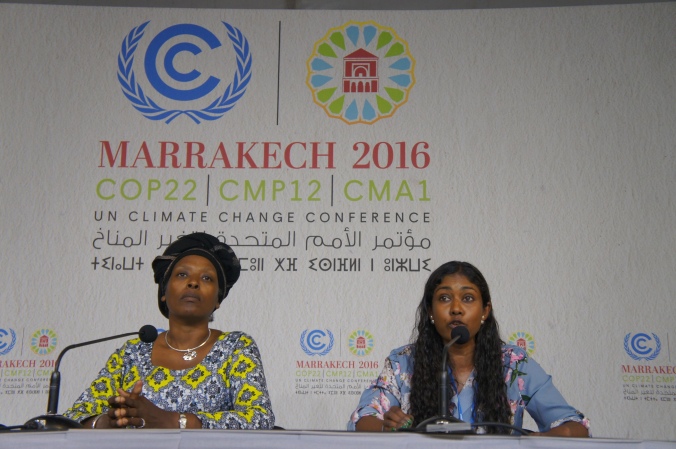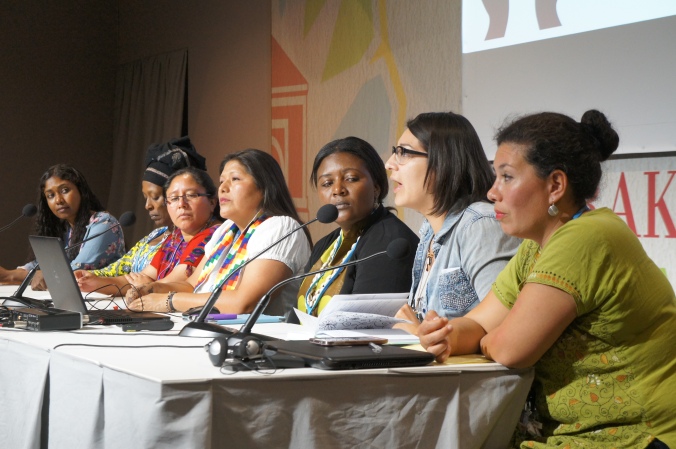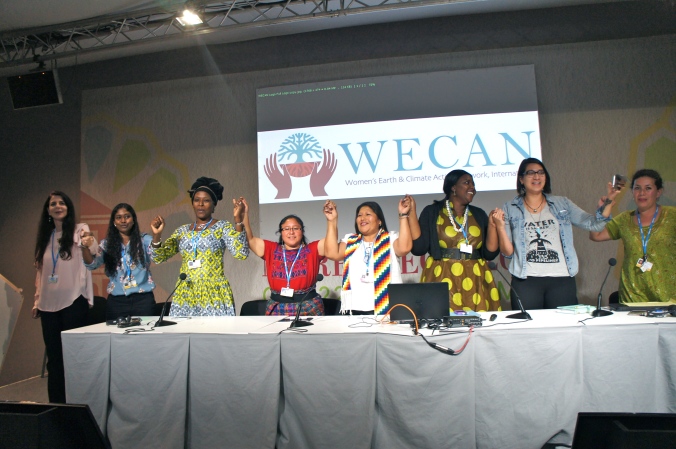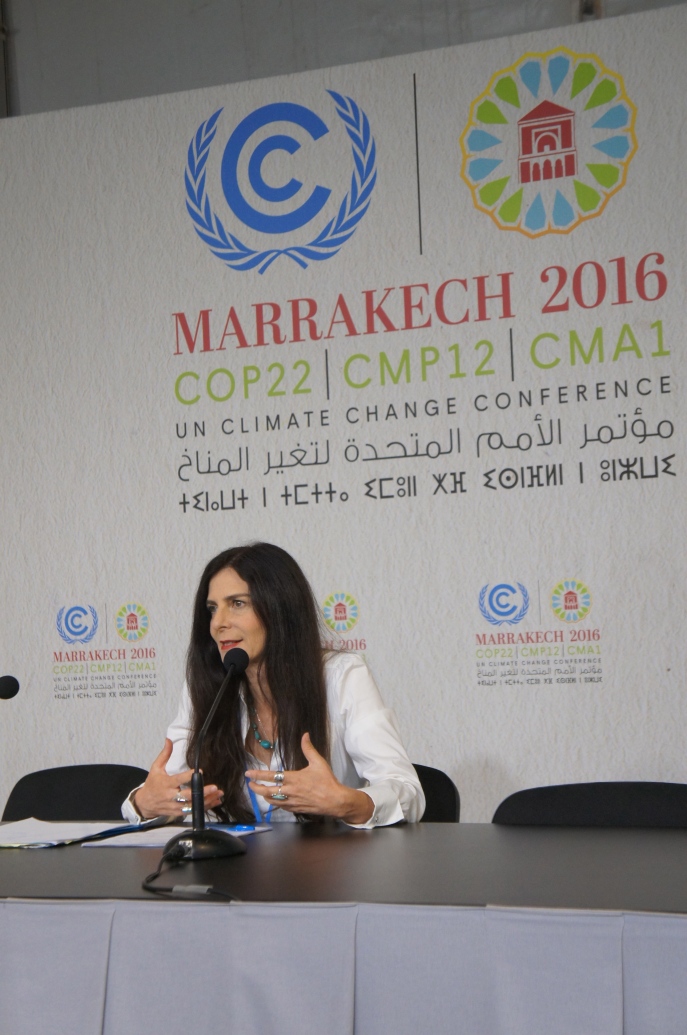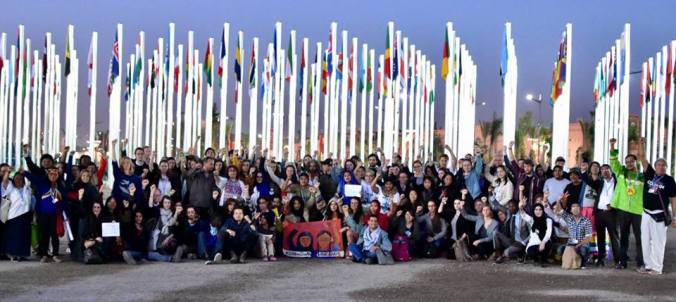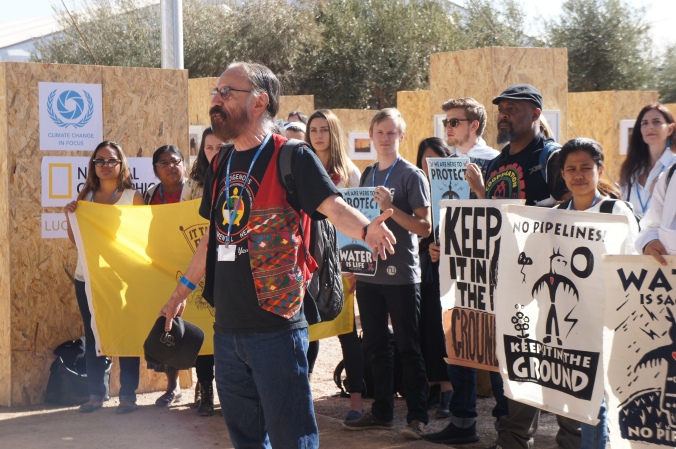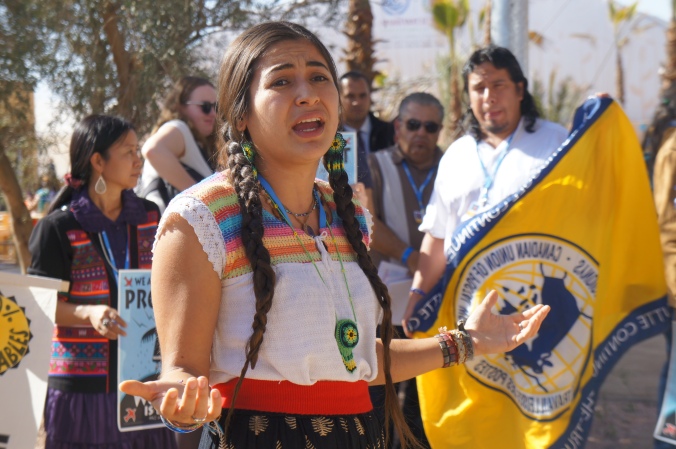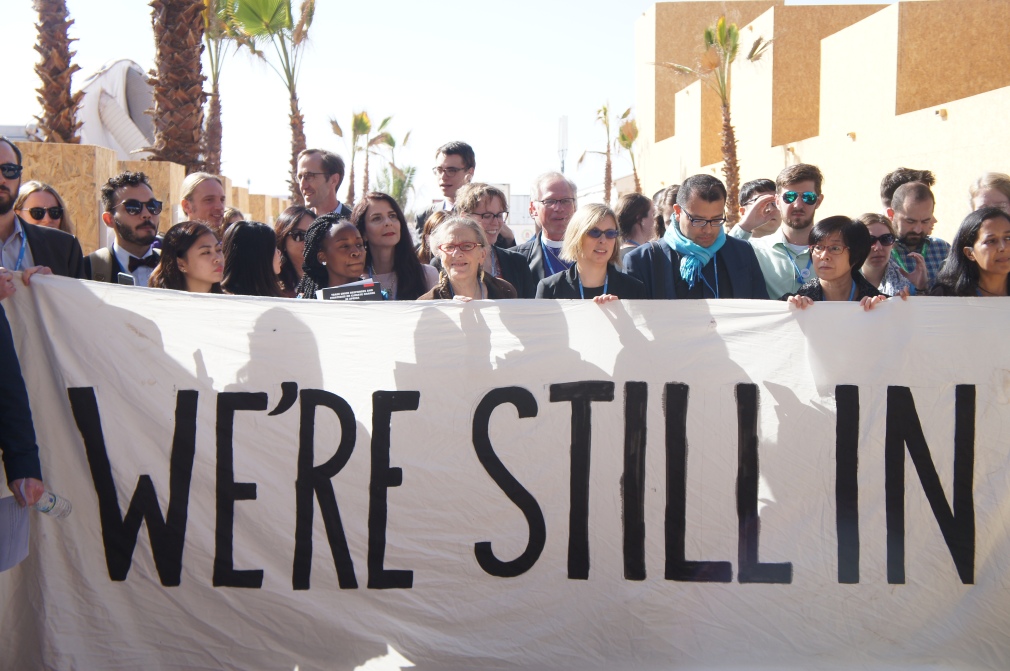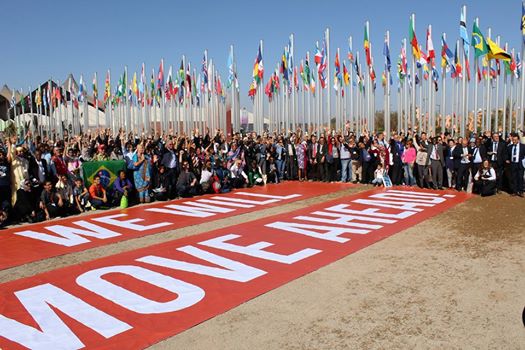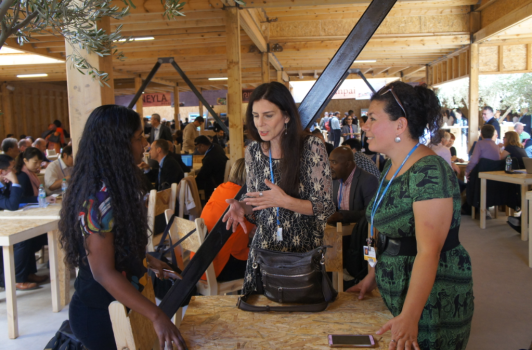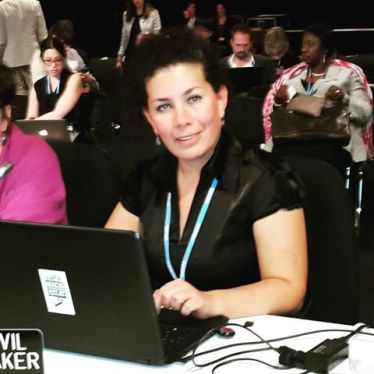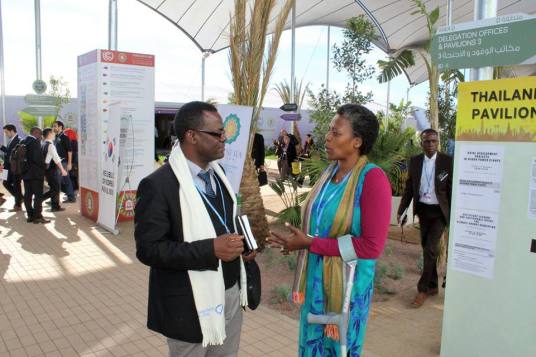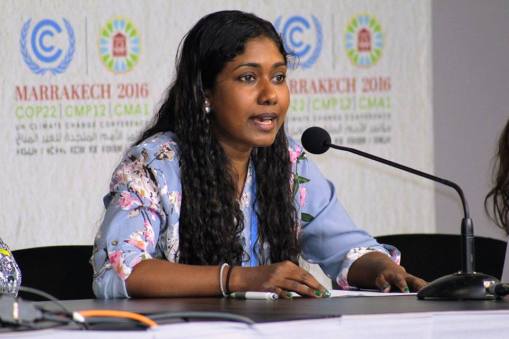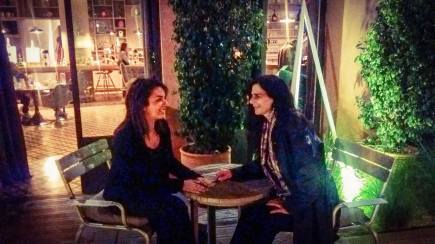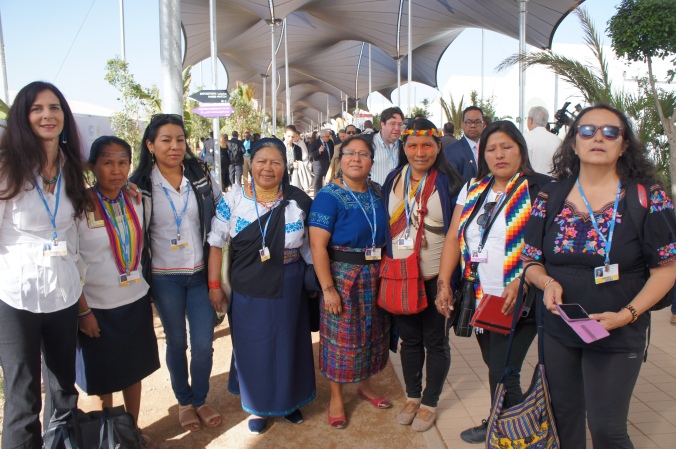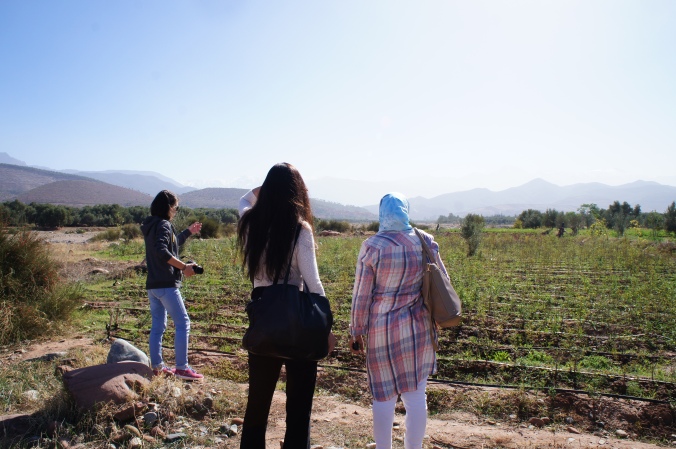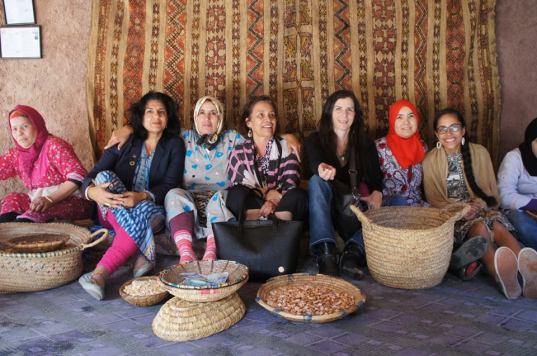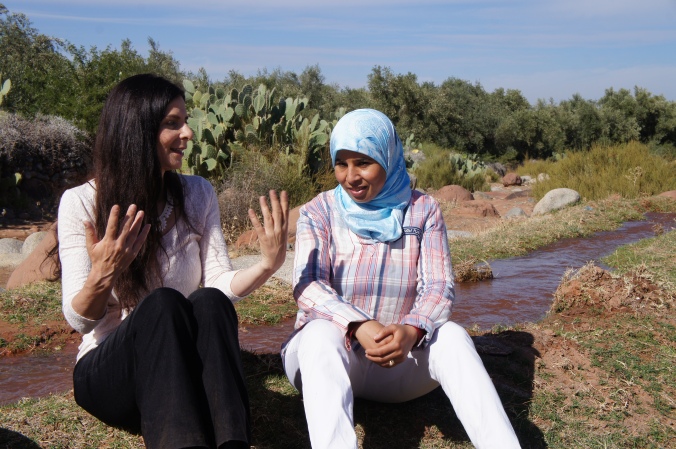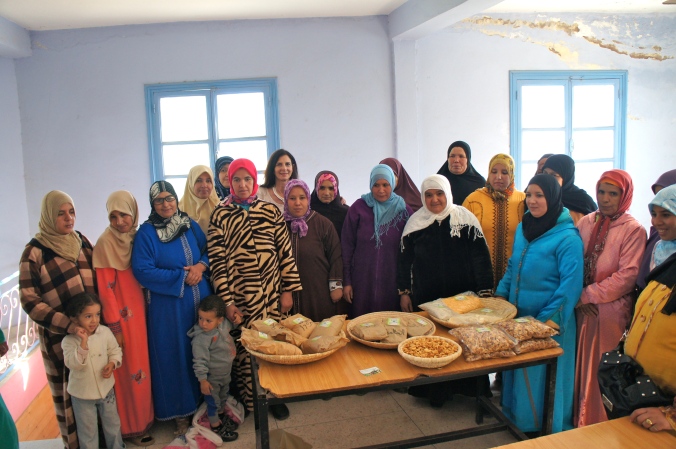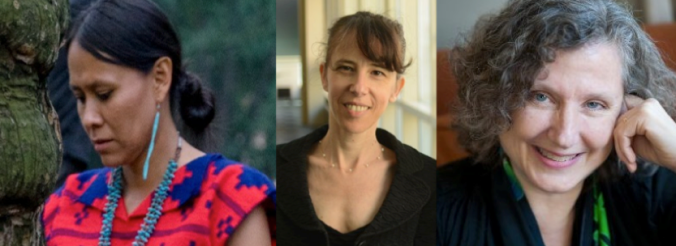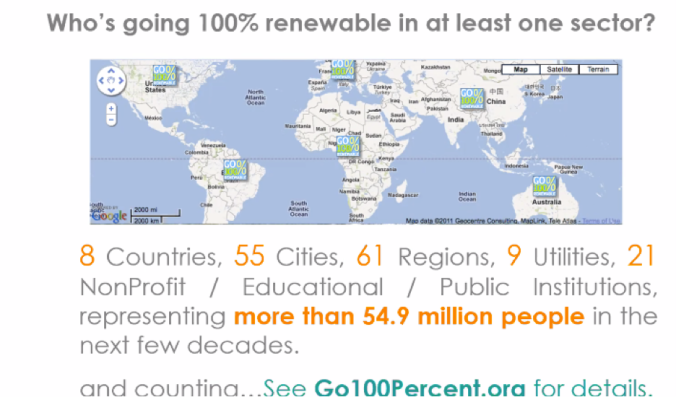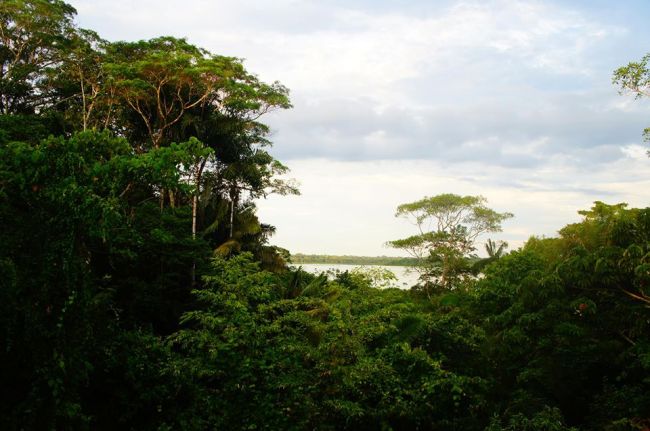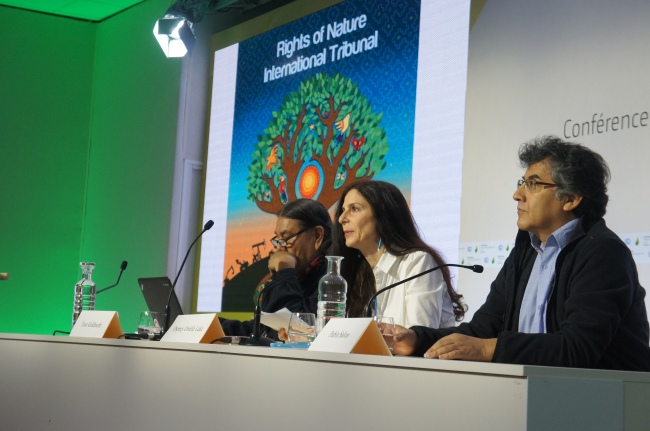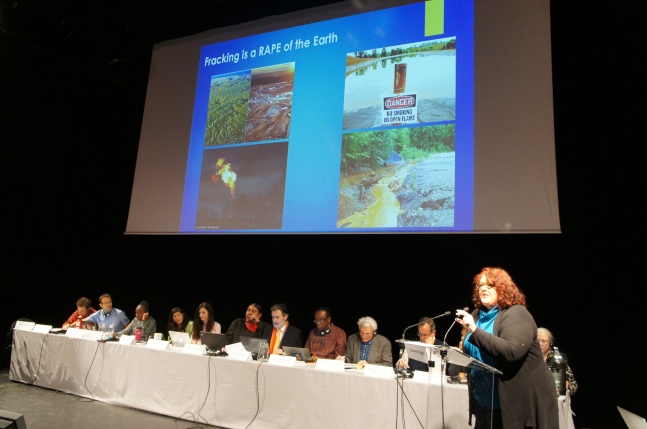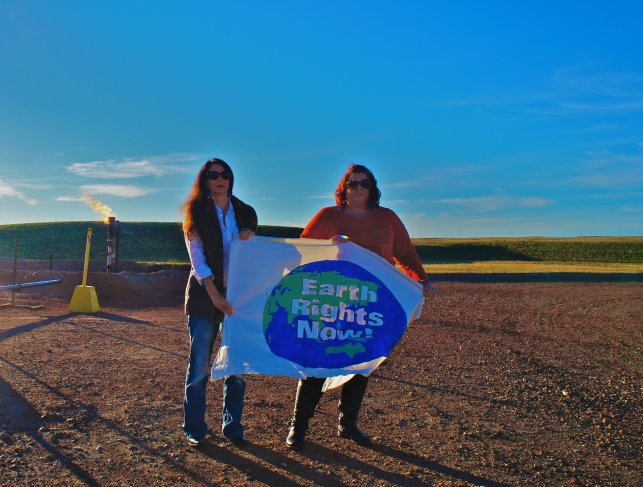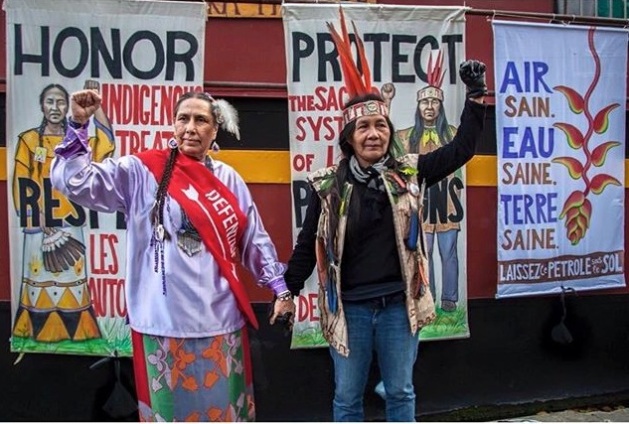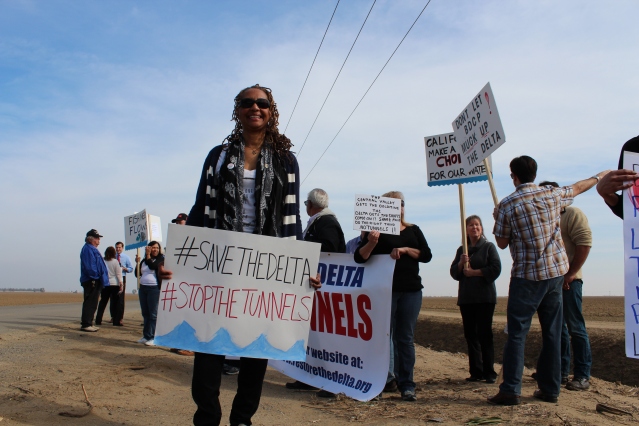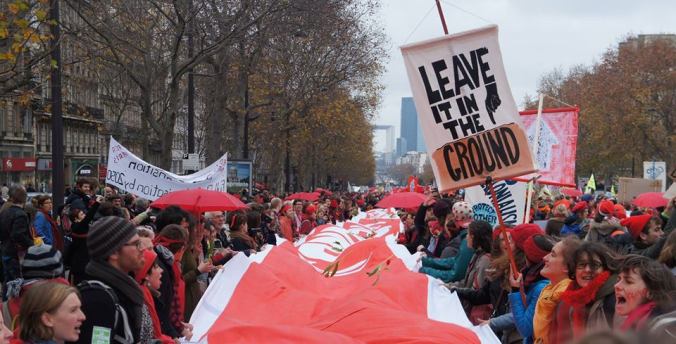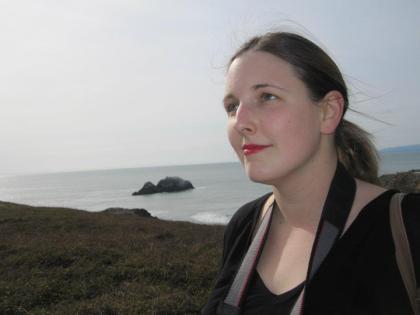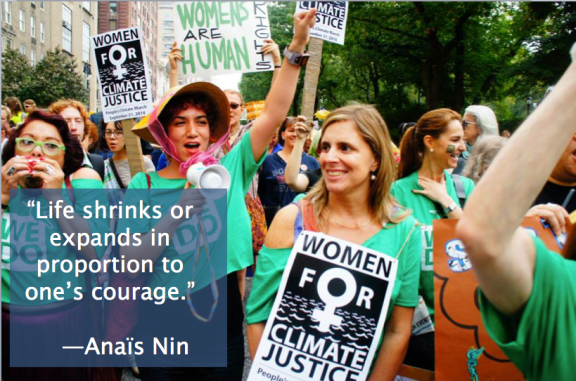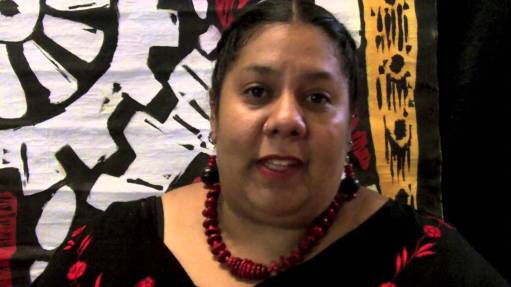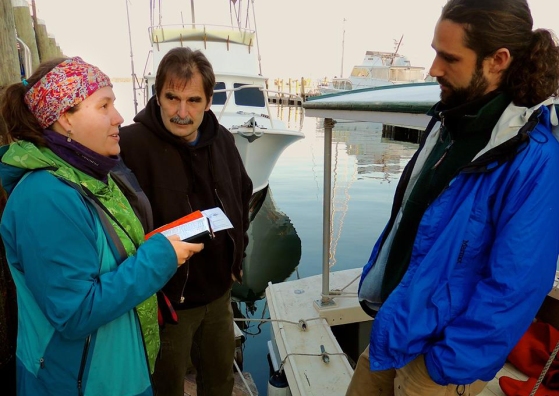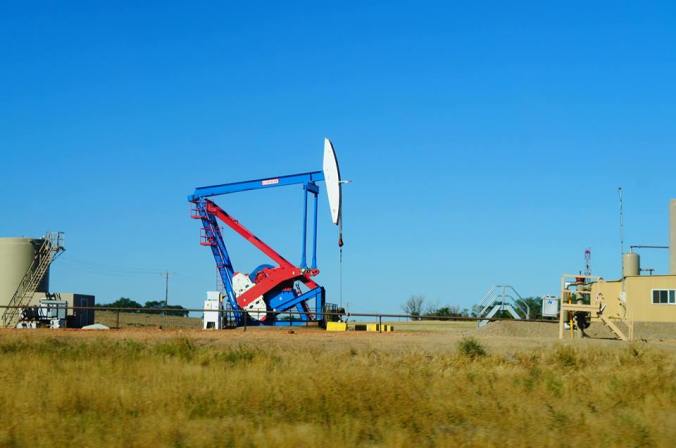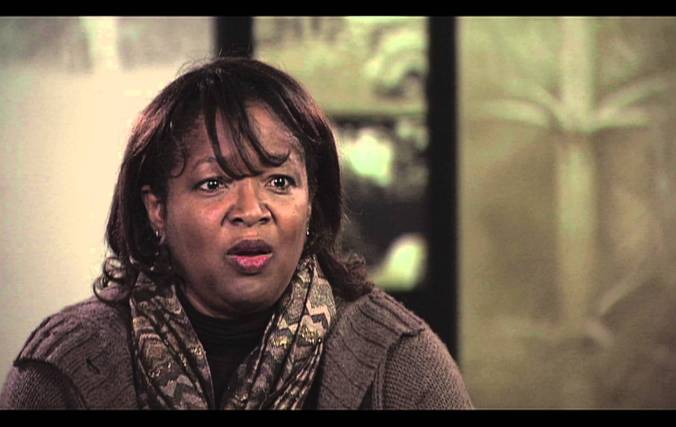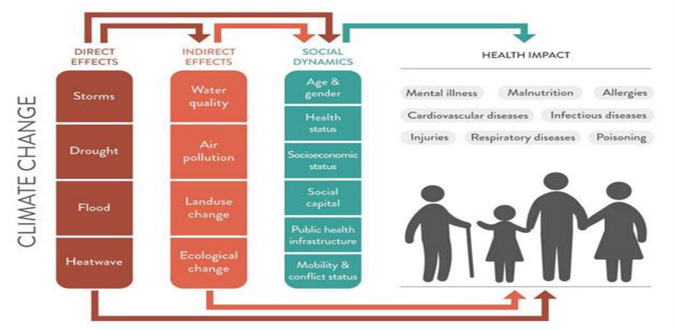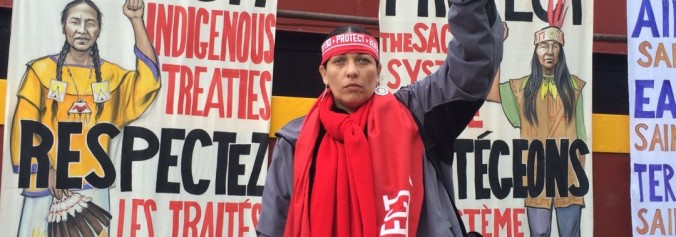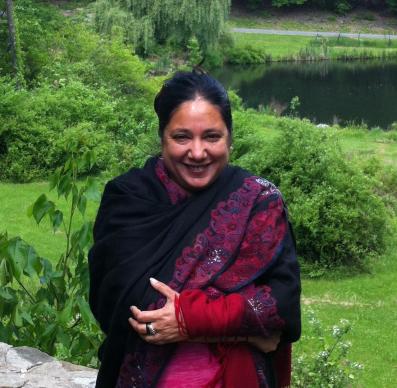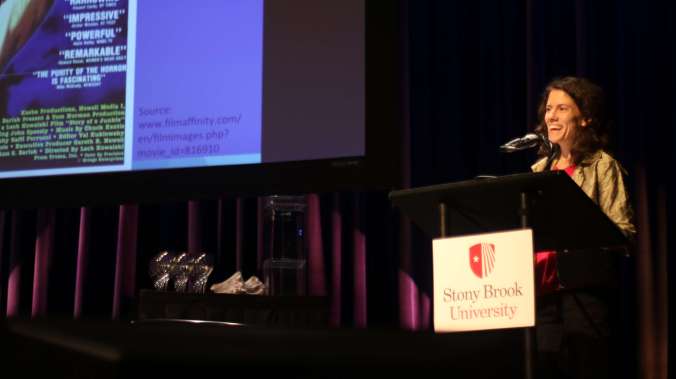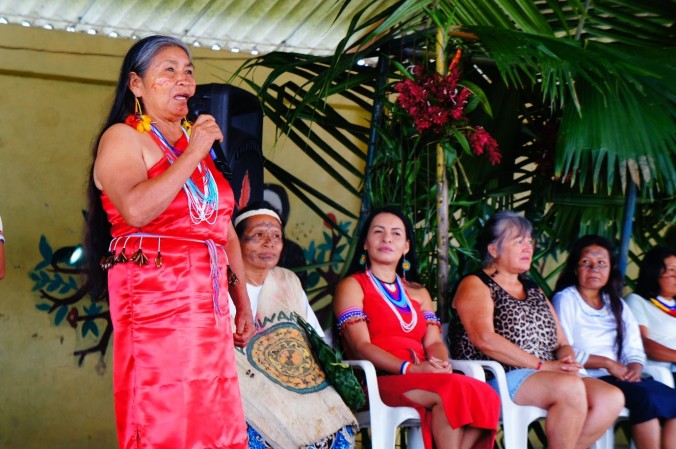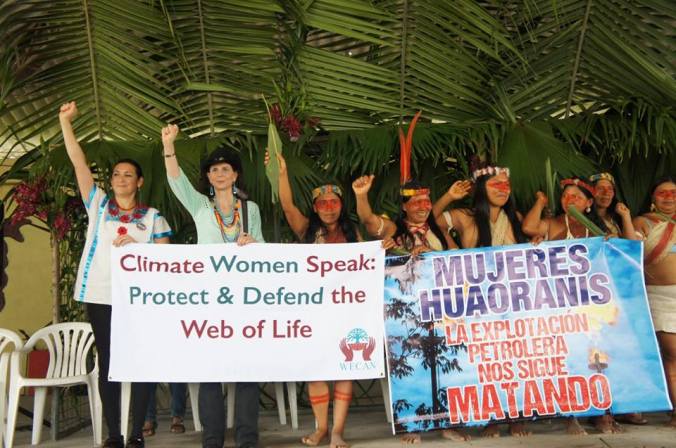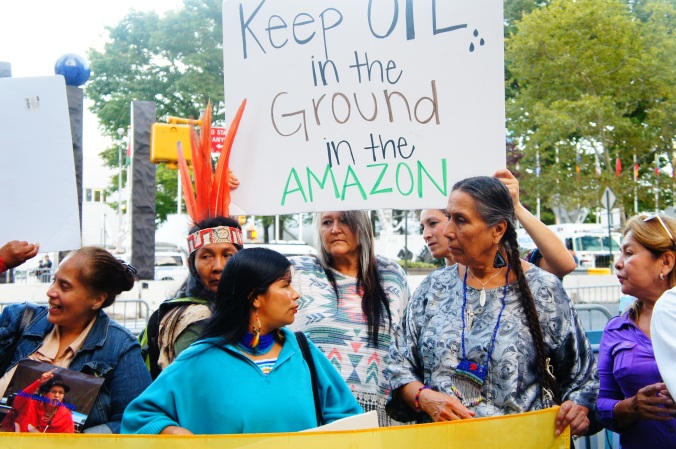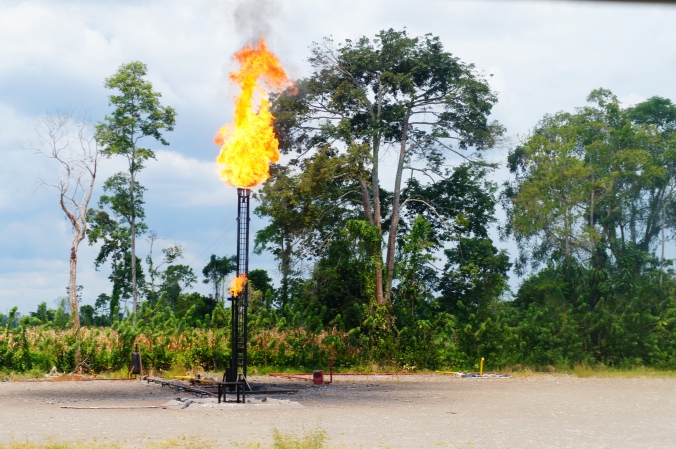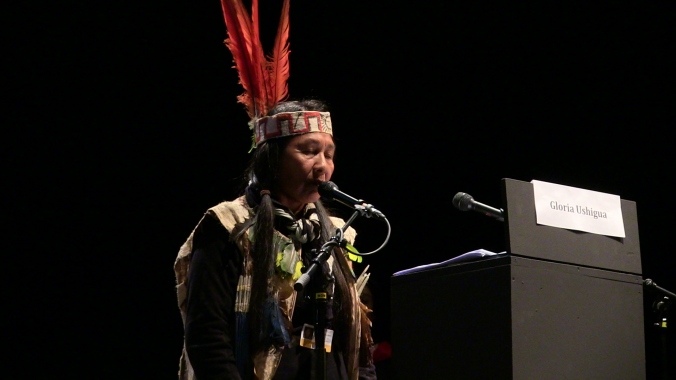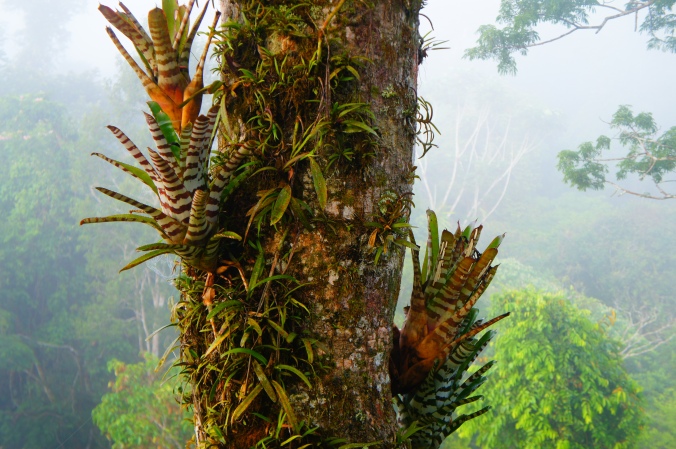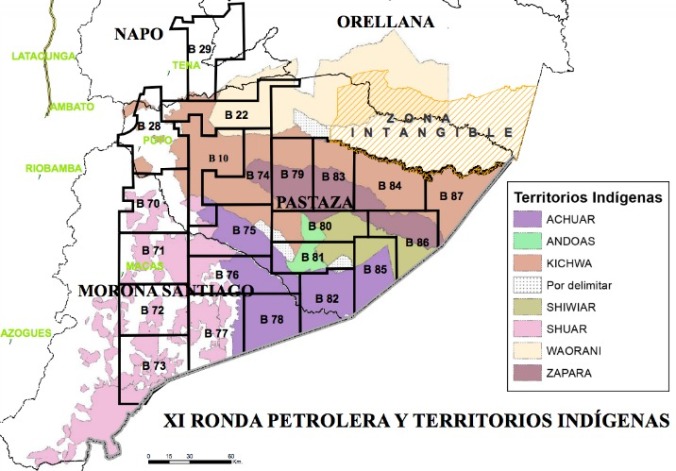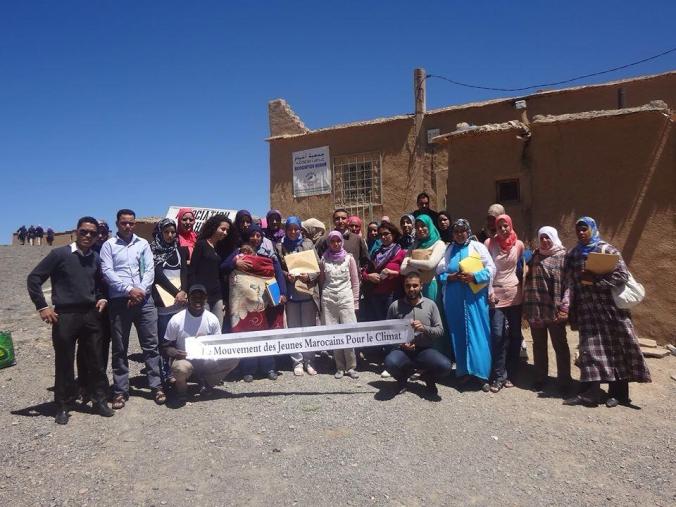Blog by Emily Arasim and Osprey Orielle Lake

- Gloria Ushigua (Sápara Nation, Ecuador) and Casey Camp Horinek (Ponca Nation, Oklahoma, USA) joined in a moment of solidarity and love. These two outstanding Indigenous women leaders are uniting across continents to protect and defend the Earth and their communities from oil extraction – Photo by Joan Beard
Indigenous women around the world are impacted first and worst by the effects of environmental destruction and a rapidly changing climate, their disproportionate vulnerability the result of a brutal intersection of colonialism, racism and sexism whose effects continue largely unabated. However despite all odds and against great challenges, it is these very same Indigenous women who are rising up, challenging the status quo and taking action to build the vital solutions so desperately needed in order to chart an equitable and sustainable course for humanity.
On May 12, 2016, an outstanding group of Indigenous women leaders from South and North America (Turtle Island) united to share their concerns, struggles and plans for change at ‘Indigenous Women of the Americas Protecting Mother Earth: Struggles and Climate Solutions’, an afternoon event presented by the Women’s Earth and Climate Action Network (WECAN) International and our allies at Amazon Watch and the Indigenous Environmental Network.
‘Indigenous Women of the Americas Protecting Mother Earth: Struggles and Climate Solutions’ was held in New York City in parallel to the United Nations Permanent Forum on Indigenous Issues, with the expressed purpose of bringing public visibility to the diverse stories, solutions and demands of frontline women climate leaders.
While the sentiment and experiences shared by each speaker was unique and firmly rooted in their own homeland and place – there were two overriding themes that flowed from the women’s words: (1) respect for and implementation of Indigenous rights and knowledge is a prerequisite for climate justice and effective sustainability solutions and (2) in protecting the rights, health, lives and lands of Indigenous peoples, we ultimately safeguard the future not only of Indigenous nations (which is reason enough), but of the Earth and all it’s people. We are all unequivocally interdependent within the systems of life.
Throughout the presentations, the women also illuminated important points around the meaning of being an aware, respectful and diligent Indigenous ally, and shared a vision for the thriving future that we might still have if we learn to truly honor and uphold Indigenous rights at a global scale.

Pictured left to right: Aura Tegria Cristancho (U’wa, Colombia), Leo Cerda (Kichwa, Ecuador), Gloria Ushigua (Sápara, Ecuador), Casey Camp Horinek (Ponca, USA), Crystal Lameman (Beaver Lake Cree, Canada), Osprey Orielle Lake (WECAN Executive Director) introducing the panel of speakers. Not pictured: Alicia Cahuilla (Huaorani, Ecuador) and Kandi Mossett (Mandan, Hidatsa, Arikara, USA) – Photo by Joan Beard
In honoring the traditions of Indigenous allies, the event opened with prayers by Casey Camp Horinek, elder and a leader of the Ponca Nation (Oklahoma, Turtle Island, USA), who called for attention to the gift of the present day, and the capacity we all have to act, stand and relate to Mother Earth in a different way.
Casey reminded audience members that we are all relatives of each other and of the Earth, and that our greatest hope for the future lies in remembering this and growing together in strength and unity. She called upon all present to thank and honor the women and men who came before, standing in the face of adversity on behalf of the Earth, and through their brave actions allowing us to be here together today.
Osprey provided introductory remarks and a base for the day’s presentations by highlighting how Indigenous peoples, and Indigenous women in particular are the most vital voices and solutions bearers in the fight to address climate change and it’s roots in deep structural injustices within our social, economic and political systems. The audience was reminded that over 80% of the worlds remaining biodiversity lies in the hands of Indigenous communities, who have coexisted with and maintained these living systems for generations.
“We must make it very clear that we are interconnected. They [Indigenous women] are the ones on the frontlines defending our air, the mountains, forests, rivers. They are keeping the web of life alive, and if they go down we are all going down. People are putting their bodies on the line, people like Berta Cáceres… and we need to understand that this is directly our family. These women are on the frontline making possible the continuity of life for all of us, so let us listen deeply and engage,” Osprey commented.

Gloria Ushigua – Photo by Joan Beard
Gloria Ushigua, President of the Association of Sapara Women, spoke first, with translation by Leo Cerda (Kichwa) of Amazon Watch. [All translated quotes should be considered translations, not direct quotations]
Gloria is a land and community defender from deep within the southeastern Ecuadorian Amazon, committed to maintaining the cultural identity and integrity of the Sápara peoples and promoting the rights of Indigenous women. She stands at the forefront of the regional movement to stop oil drilling – speaking out, advocating within the United Nations, and leading marches and demonstrations in response to violent policies that continue to open the Amazon of Ecuador to fossil fuel development and the subsequent pollution and displacement of Indigenous communities.
In January of 2016, the Ecuadorian government and Chinese state owned oil corporation Andes Petroleum signed a new oil lease handing over almost one million acres of pristine rainforest forest overlapping the traditional territories of the Sápara people, as well as their neighbors the Kichwa of Sarayaku and the Shuar. On March 8, 2016, International Women’s Day, Gloria and hundreds of other Indigenous women of seven regional nationalities took to the streets in Ecuador to denounce the new contract. Their resistance to the new oil leases has been ceaseless.
“Our lives and our spirits depend upon the land that we live on, and they [the oil companies] do not understand this relationship that we have between the land, our families, our ancestors and the spirits.”
Gloria provided background on the intense threats and pressures her peoples are feeling to cede to extraction on their homelands, which remain uncontaminated unlike their neighbors to the north.
“We are going through a lot in our territory. The government has been threatening us and trying to create division within our territory… They think that we are going to get weakened by the divisions, by all of the problems they are bringing into our community, but they don’t know that we are strong and we will still stand strong even though they want to try to create this struggle. We are very few people, only about 200 in our territory, but we are strong. This is our land, this is where we have our livelihoods, our medicine, our water, our food.”

Gloria Ushigua marches against oil extraction in the Amazon of Ecuador
Article 57 of Ecuador’s constitution requires that the consent of Indigenous peoples is obtained before any projects that impact their ancestral land or exploit resources within their territory lands can proceed. Indigenous consent is also a requirement of international law under the auspices of Free, Prior, and Informed Consultation (FPIC).
While the Ecuadorian government has repeatedly claimed to have consulted the Sápara Nation about the new oil leases, in actuality, they have instigated a campaign to intimidate and divide the Sápara. As Gloria made clear, in spite of the government’s false claims of community approval and attempts to create a divided Sápara leadership body, the legitimate federation of the Sápara does not and will not recognize any consent for access to or development in their territory.
“I come here to bring the message from my people….the government thinks we are alone but we are not alone, we have an international community of supporters like you, like the people here…” Gloria continued, “The people in my community want to keep oil in the ground, and that is a consensus.”
In the month following the May 2016 event in New York City, Gloria Ushigua and her family members and community began suffering from escalated violence, intimidation and harassment. In solidarity with Gloria, Frontline Defenders and the Women’s Urgent Action Fund have both released urgent statements for organizational sign-on and wide spread public sharing and advocacy.

Indigenous women leaders of seven Indigenous allies march against oil extraction in the Amazon in Puyo, Ecuador on International Women’s Day, March 8 2016. Gloria Ushigua (Sápara Nationality, Ecuador) and Casey Camp Horinek (Ponca Nation, Oklahoma, USA) pictured at left – Photo by Emily Arasim
Alicia Hueiya Cahuilla is Huoarani woman leader, born and living in what is now called Yasuni National Park, Ecuador, spoke next. Alicia is the Vice President of the NAWE, the Association of the Huaorani Nationality of Ecuador, and has also served as the President of AMWAUE, the Association of Huaorani Women of Ecuador. She is a foremost woman defender of Yasuni, and has received death threats and faced other intimidation for her work.
Alicia Hueiya believes that action to respect Indigenous rights and keep oil under the ground is the most vital, effective climate solution, and has delivered this message, and the story of her communities poisoning and resistance, with great conviction in front of grassroots leaders, concerned allies, news and media, international governments and policymakers and fellow Indigenous women land defenders across the globe. Alicia spoke at a WECAN International event in Lima, Peru in 2014 that ran parallel to the UNFCCC climate talks at COP20 – watch the powerful coverage on Democracy Now! here.
Unlike Gloria and the Sápara people in the Southern Ecuadorian Amazon, the land immediately surrounding Alicia’s homeland in the Northern Amazon has already been experiencing the horrendous impacts of oil extraction for several decades.
Alicia told the story of women in her community and other as rising as the voice of the Amazon herself. She denounced excursions for oil into supposedly protected national parks such as Yasuni, and made clear that it is the lands in Indigenous hands, free of oil extraction that continue to flourish, create real development, provide for their people and maintain the balance of the global climate.
At Alicia’s request, her direct comments, quotes and photos have not been shared publicly outside of the event, and are not included in this blog.

Aura Tegria Cristancho (U’wa people of Colombia) and Leo Cerda (Kichwa people of Ecuador, Amazon Watch) – Photo by Joan Beard
Following the translation of Alicia’s powerful presentation, Leo Cerda, Amazon Watch Field Coordinator and Kichwa man from the city of Tena, Ecuador, shared more background and an update on the unfolding situation in Ecuador.
Leo explained that the Ecuadorian government is repeatedly violating the Rights of Nature officially enshrined in their 2008 constitution, and also failing to respect laws of Free, Prior and Informed Consent of Indigenous peoples regarding fossil fuel extraction and mining. Echoing Alicia, he explained that even the countries national reserves are no longer off limits.
Leo further detailed the story of the ‘11th round’ of oil concessions, which opens up over twelve million acres of vibrant forest to extraction in 16 ‘oil blocks’. The two blocks encompassing the lands of Gloria and the Sápara people represent just two of these sixteen potential disaster zones.
“The process of the government is to try to create division within organizations and communities. So the women in the past years have been the strongest ones to come up front – they are the frontlines,” Leo explained, referencing many past actions including the March 2016 International Women’s Day march in Puyo, Ecuador.
“We see an uprising of the women coming together…because their territories are going to be effected, because they take care about the land and they care about the future, the future of next generations. We are talking here about climate change, about human rights – and this is not only an Indigenous struggle anymore, this is a struggle of all of us, the people that breathe…if we don’t protect the Amazon and forests around the world, how will our children live?”
“I am honored as the next generation to be with such amazing women speaking out,” Leo reflected.

Kandi Mosset (Mandan, Hidatsa, Arikara) leads a ‘toxic tour’ of a fracking spill site near the Fort Berthold Reservation, North Dakota, USA – Photo by Emily Arasim
Kandi Mossett spoke next, joining the event via Skype.
Kandi Mossett is a Mandan, Hidatsa, Arikara women from what is now called the Fort Berthold Reservation, North Dakota, USA. Kandi stands on the frontlines of the fight to stop fracking and other forms of extreme energy extraction through powerful community organizing efforts and work as the Indigenous Environmental Network Extreme Energy and Just Transition Campaign Lead Organizer. She has emerged as a leading voice in the fight to bring visibility to the impacts that climate change and environmental injustice are having on Indigenous communities across North America, engaging in international advocacy work, including participation in several UN Forums and a testimony before the U.S. Congress on the climate issue and its links to issues of health, identity, and well being on tribal lands.
She introduced herself and began her presentation in her native language, “Hello relatives my name is Eagle Woman, my English name is Kandi Mossett.”
Kandi told a brief history of the Mandan, Hidatsa, Arikara peoples, three groups driven together following colonization and the brutal devastation of the smallpox epidemics inflicted by US settlers. After facing and surviving generations of colonization, Kandi explained that her people now face a new danger threatening to take their lands and livelihoods – the threat of hydraulic fracking.
Since the early 2000’s, a fracking epidemic in the Bakken region of North Dakota has rocketed the state to the position of second largest US oil producer after Texas, bringing a range of social and environmental impacts to the region, with particularly devastating effects on Indigenous women in North Dakota.
Kandi began her presentation by showing photos of turquoise lake water, the result of fracking runoff which has caused severe pollution, green-blue algae blooms and oxygen deprivation in Lake Sakakawea, a dam at the center of the at Mandan, Hidatsa, Arikara lands, and at the headwaters of the Missouri River.
She also shared photos from a July 2014 fracking brine spill near the lake, which residents were told was nothing to worry about despite the visible dead zone and failure of the US Environmental Protection Agency to provide full reports and analysis.
Kandi recounted how local women leaders, including Lisa DeVille, spearheaded action and brought Duke University students out to take soil samples and analyze the spill site and dead land. Their report back told of high levels of benzenes and a wide range of cancer causing chemicals far exceeding safe consumption levels – all left sitting on the surface of the land.
“Own tribal council has sold out to corporations – they believe the lies, they believe it is safe without doing their own due diligence,” Kandi explained.
She detailed some of the horrendous environmental practices taking place in North Dakota, including largely unregulated direct flaring (burning) of natural gas. The open flares make the once dark plains of the state glow on satellite images like the lights of a major metropolis, and have made the Bakken the source of more that 2% of global methane emissions.
Kandi spoke solemnly, “No matter where you are in the world, you are still breathing this in.”
She recounted the rush of dangers experienced by local communities, including toxic air, poisoned water, oil truck explosions, and countless social ills brought by oil workers – ranging from vandalism and racist threats, to human trafficking, drug abuses and violent abuse of local women.
Many of the social dangers are centered in ‘man camps’, large trailer complexes housing hundreds, even thousands of oil workers. In a context of lawlessness and disregard for local Indigenous communities and the land, where Kandi reports that rapes have shot up roughly 168%, with the vast majority of abuses falling upon Indigenous women.
“Violence against women follows violence against the Earth. Them digging, flaring, polluting – this is violence against our Mother…We are facing so many social problems and we haven’t even begun to really see the environmental problems, that’s why I get so emotional. Twenty years down the line we will see it, the bone cancers from the radioactive materials… I am scared for our children and our future and this horrible legacy we are leaving behind. And so we are saying we wont do this anymore, lets get out and fight this.”
Even in the face of great pain, Kandi held out countless examples of reason for hope.
She told the story of the Standing Rock Sioux in the Southern part of the state, who had witnessed the devastation of Mandan, Hidatsa, Arikara peoples to the north, and stood up to push back, block pipelines and ban fracking within their sovereign lands.
Mandan, Hidatsa, Arikara youth in Fort Berthold are also standing up, joining local women like Kandi and Lisa DeVille who have been fighting to expose the extreme circumstances on their lands for years. As Kandi spoke via Skype, a group of young Fort Berthold youth had just mobilized and rode horses over a Lake Sakakawea bridge to interrupt a tribal council meeting and deliver their message against continued exploitation of the Earth and her peoples.
“People are starting to see it, youth are starting to stand up and say ‘What are we doing to our planet?… We are up against big money, big corporations, but over the past years we’ve seen more and more that all it takes is people power, our youth fighting back to make change.”
Kandi reflected that standing out and being an activist is often a frightening thing to do, but that “we are all we have…We as human beings taking action are the only ones that can change the problems that we humans have created…so use your voice, fight back.”
She provided more hopeful examples including a recently held water blessing on Fort Berthold reservation, which Kandi’s elders said was the first large collective water ceremony in over 20 years. She cited other important cases of Indigenous leadership and resistance, including the recent horse ride across South Dakota in opposition to the Dakota Access pipeline; the story of youth who ran over 500 miles to the Army Corps of Engineers in Nebraska to say no to fossil fuel infrastructure; and the broad and quickly growing global #KeepItInTheGround movement.
Kandi spoke to the great need for creative activism and community organizing, and for the peoples’ movement to get together, hold onto tradition and show our power. She called for simultaneously organizing locally and connecting across borders, recalling powerful work connecting pipeline fighters from the US Gulf Coast to North Dakota and the Canadian Tar Sands, as well as the ground breaking work of the Indigenous Women of the Americas Defenders of Mother Earth Treaty Compact signed between Indigenous women of the US, Canada and Ecuador in 2015 and now being signed by many Indigenous women worldwide.
“We have to make it so that it is no longer profitable and OK for them [oil companies] to continue their business as usual,” Kandi explained, emphasizing that rather that pursuing a ‘not in my back yard’ type of fight, we must stand together to stop extraction in North America, and the homes of all our global brothers and sisters.
“We are addicted, to oil, and it is no better that any other addiction people have. If we want to get off this addiction we need to come together, with Indigenous women leading all across the frontlines….We know we have to protect the water. It is no coincidence that our babies are born in water…. We know that water literally is life, and it has to be protected at all costs.”
Kandi ended by urging audience members to study and explore colonization of the mind.
“What we are really talking about is decolonizing, and changing our mindset, changing the way that people interact with each other…” Kandi explained, “We want to protect future generations, and protect seven generations ahead.”
Most politicians and corporate barons, she pointed out, don’t think of the past or future generations “because they have a sickness, and that sickness is called greed.”
To build a foundation of climate justice, she pointed to the need for decolonization and a move away from extractive capitalism, which both center on the idea that we can “take and take and never give back”, something explicitly discouraged in all Indigenous worldviews.
“As Indigenous people we have ‘Traditional Ecologic Knowledge’, but here is the secret – ‘common sense’. Whatever happens to one person happens to all of us.”
Crystal Lameman, Beaver Lake Cree of Treaty No. 6, Alberta, Canada took the floor next.

Crystal Lameman – Photo by Joan Beard
Crystal Lameman is the Treaty Coordinator and Communications Manager for the Beaver Lake Cree Nation, working previously as a Climate and Energy Campaigner for Sierra Club Canada, Prairie Chapter and as the Canadian Tar Sands Campaigner for the Indigenous Environmental Network. Since 2008, Crystal has been at the forefront of legal action by the Beaver Lake Cree, calling for action to address infringement of their people’s inherent and Treaty Rights to hunt, fish, trap, and gather in perpetuity, due to over-industrialization and extraction in their territory.
Crystal opened in her traditional language, and provided background on her home in the lands of the Cree and Dene.
Today, Crystal reported that Alberta, Canada is the source of more than 37% of the countries greenhouse gas emissions. Roughly 22% of these emissions come from the Alberta tar sands, making them the single biggest source of climate change causing pollution in Canada, and one of the largest sources of emission in the world.
Crystal explained that tar sands extraction has a dire two-fold impact, contributing to long-term climate change, while also wreaking havoc through immediate environmental consequences. Both long term climate changes and direct pollution are having growing impact on the land and the Indigenous Nations, like Crystal’s, who maintain a close relationship with the land, and rely upon it directly for medicines, food and water. Because of this close relationship, Indigenous communities are often the first to see and experience the degradation of the land, and contamination and displacement of ecologic and social communities.
Crystal mapped out the three large tar sands oil deposits in Alberta (cumulatively the third largest global crude oil deposits after Saudi Arabia) and the three Indigenous treaty territories violated by their extraction.
“Through invasive energy extraction we have found ourselves, literally, in a fight over Mothers bones, her very core – playing environmental roulette with our lives… and there is one thing about that game, someone always looses, and right now it is our next generations that are loosing… Right now my biggest responsibility is that I am a mother, I am blessed to give life, and I have a responsibility to those children,”
In addition to speaking to the dire effect of tar sands air and water pollution, she also spoke to the dire situation around deforestation of Canada’s pristine Boreal forest.
According to Crystal, millions, if not billions of tons of ‘overburden’, the industry term for pristine forest and soil, and one of the worlds most important carbon sinks – is ripped away, moved and destroyed to make way for expanded extraction. In total, the amount of land destroyed and moved for extraction in Alberta is estimated to be more than for the Great Wall of China, the Suez Canal, Great Pyramid of Cheops and 10 largest dams in world – combined.
A large portion of tar sands expansion is happening in and around Indigenous First Nations territories, on lands being taken and violated without respect to internationally recognized rights of Indigenous peoples to Free, Prior and Informed Consent. Crystal additionally cited Article 32 of the United Nations Declaration of the Rights of Indigenous peoples, which declares Indigenous rights to determine and direct priorities for use of land and resources that fall within or affect their territories.
34,773 of the 38,972 square kilometers of the Beaver Lake Cree Nation’s traditional territory as been leased to oil and gas and is suffering the cumulative impacts of removal of forests, soil loss, oil pollution, toxic spills, run off, and disruption of migration patterns, to name but a few.
Contamination of traditional foods, including fish, beaver and moose, is growing threat, with arsenic levels in caribous recently found to be reaching 450 times higher than safe consumption levels.
“They [the government and oil companies] like to talk about ‘reclamation’, essentially trying to give back what was never theirs to take,” Crystal asserted. Despite this, only 0.2% of tar sands extraction lands have seen any type of restoration attempts.
Despite the great loss faced by her community and others across Alberta, Crystal continued on to provide incredible reasons for hope.
“Some of our last remaining forests, the planets biodiversity, rivers, lakes and streams are in Indigenous peoples territories…So in order to fight climate change, stop deforestation and meet sustainable development goals, there is an urgent need to recognize the collective land rights of Indigenous peoples,” Crystal explained, making the case for Indigenous rights as perhaps the most important, effective rights-based legal mechanisms for environmental and social defense.
“Through the rights of Indigenous peoples, we have the last remaining stronghold in protecting our environment.”
Through the ongoing Beaver Lake Cree legal case, Crystal and her colleagues and allies are seeking to demonstrate that Indigenous rights are the strongest possible legally binding strategy to halt the expansion of the tar sands.
“Many communities nations in our territories are moving towards determining what Indigenous economic sovereignty looks like by participating in the Just Transition and launching large renewable energy projections, exercising food security and sovereignty…we are growing and we are producing on our lands, while at the same time continuing to break down legislation that undermines our rights and labels us as bad people for wanting better for our children”
In closing her presentation, Crystal drew attention to the massive fires raging in Alberta, and the social justice components of work to end extraction.
“We need to stop pretending like genocide no longer exists. It continues, it is alive and well in extreme resource extraction. But we are here, as Indigenous people we are here and we are not going anywhere. And we continue to fight because the very essence of who we are is in the land and the water… so our land has not and will never be for sale,” Crystal concluded.

Aura Tegria Cristancho – Photo by Joan Beard
Aura Tegria Cristancho, young woman leader and representative of the U’wa people of Colombia, spoke next, with Spanish translation by Leo Cerda.
At 18, Aura became the first ever Indigenous U’wa woman to attend university, receiving her law degree and going on to work as the legal advisor for the Asou’Wa Association of the U’wa people. Since then, Aura has worked extensively with EarthRights International, based out of Lima, Peru. In 2014, she traveled across the US to speak with hundreds of people at a host of public presentations, private advocacy meetings and media interviews – working to bring light to Caño Limón pipeline, Magallanes drilling project and other pushes to expand oil and gas drilling in U’wa territory, which has traditionally expanded across five Colombia provinces.
Aura began with reflections based upon the stories and prayers told to her by her grandparents. In the beginning, she recounted, the creator established and created the Earth in equilibrium, and in the heart of the U’wa people, left an original message – instructions to care and protect Mother Earth. Protecting the Earth thus became the mission and center of the U’wa mind, body and spirit.
When oil companies entered their territories, the U’wa knew automatically they had to speak out in defense of the land and had no misunderstanding about the perils of extraction.
The U’wa call oil “ruiria” and explain that this is the source of all plant and animal life, as well as the human spirit.
“For the U’wa, the oil is like the blood of Mother Earth, it is vital to life – if you take out the blood, the whole planet will die, including human beings. In this sense, we must gather our strength and unite in defense of the Earth, in defense of life. All of us together, black, white, Indigenous, old young, all of us,” Aura explained to the audience.
When Occidental Petroleum came to drill the oil from their lands in the 90s, the U’wa protested, stating that they preferred collective suicide than to watch the destruction of their community and lands. It would be a worthier death than at the hands of the exploiters, the U’wa reasoned.
The U’wa people had already witnessed the ruinous results of oil extractions in nearby territories. Their subsequent campaigns, in addition to support from international groups moved by the U’wa’s powerful dedication and message to the world, generated successful results. In 2002, Occidental Petroleum withdrew from U’wa territory. In part, the company claimed this was due economic problems and finding a dry well in an early phase of the project, however it is clear that the ardent protests weighed heavily on their decision. Unfortunately, this key victory was not long lasting and the U’wa have been and are facing many ongoing extraction threats in their territories from the fossil fuel industry.
Despite loses and struggles, Aura stated that the movement is only getting stronger. She and her people are fighting immediate environmental destruction, but also acting and teaching so that ‘little brother’ (the Western world) can come to understand again what life really is, namely the rivers, air, forests and all that sustains us.
On May 12, as Aura spoke to the crowd gathered in New York City, leaders in her community were taking direct action to protect their sacred Zizuma mountain, a critical source of water for the region.
In closing, Aura urged all present to engage with and support their ongoing struggle, and to think deeply on how we can change the dominant cultures way of living with the Earth.
“We need to change ideas around money. You cannot eat money. Without lands and water and territory, money serves no purpose. In this sense, this can be a huge contribution to change from all of us here today, to work to help change this philosophy– to return to the ancestral, the roots, to return to understanding of what is truly important in life – land, water, air and the sky.”

Leo Cerda and Gloria Ushigua stand in solidarity with the U’wa people in their efforts to protect sacred Zizuma mountain– Photo by Joan Beard
Casey Camp-Horinek of the Ponca Nation, Oklahoma, Turtle Islands, USA took the floor as the last speaker of the day.
Casey Camp is a Ponca Nation tribal Councilwoman, Indigenous Environmental Network representative and WECAN Advisory Council member, amidst many other roles. She is a long-time Native rights activist, environmentalist, actress and traditional Drumkeeper for the Ponca Pa-tha-ta, Woman’s Scalp Dance Society, working to maintain the cultural identity of the Ponca Nation for herself, her family and her community. Casey has been at the forefront of grassroots community efforts to educate and empower both Native and non-Native community members on environmental and civil rights issues. In 2008 Camp-Horinek, as a delegate of the Indigenous Environmental Network (IEN), was chosen to speak to the United Nations Permanent Forum on Indigenous Issues and present IEN’s global platform regarding the environment and Native rights. Since then, she has led and participated in countless international and local actions, events and high level policy forums around climate justice, Indigenous rights and care for the Earth. Recently, she embarked on a journey as a leader of the Indigenous Women of the Americas Defenders of Mother Earth Treaty Compact.

Casey Camp Horinek – Photo by Joan Beard
Casey began by commending and sharing her love with the young women who spoke before her; “I could rest, but I am not going to!” she laughed.
Casey told of the genocide inflicted upon her people, including days of forced removal, boarding schools, relocation and five signed and broken treaty’s. Like Kandi and Crystal, Casey likened the modern boom in fracking to a continuation of these genocidal and colonial processes.
Ponca lands in Oklahoma are now surrounded by underground toxic waste storage facilities, drilling rigs and a “nexus” of pipelines carrying oil across the US and down from Canada to the Gulf of Mexico.
Taking out a piece of paper, Casey explained that seven earthquakes had already happened in Oklahoma that very day. She reported 128 in the last thirty days and 2,388 in last year – all man-made and all directly linked to fracking injection wells, of which there are over 10,000 in the state.
Recently, Oklahoma’s new governor passed a law preventing communities within the state from passing local fracking moratoriums. In response, Casey, along with other leaders in her community, are working to organize the Ponca Nation to use their sovereign Indigenous rights to pass a resolution that stops injection wells, and puts a ban on fracking and dewatering.
The resolution points out that the Bureau of Indian Affairs (BIA) and Bureau of Land Management (BLM) are the trustees of the Ponca Nation and its members, “with a fiduciary duty to protect tribal trust property and trust resources”, including federally reserved Indian water rights to a satisfactory supply of quality water.
Thus far, the BIA does not have a policy on fracking, injection wells and dewatering operations to guide the leasing of Ponca lands or to guide BIA approval of assignments of existing oil and gas leases for extraction. Even though there is not a policy in place, the BIA has been approving leases already, not taking into account Indian water rights or the public safety of the Ponca Nation and its members, amongst other destructive outcomes.
The BIA has also not obtained Free, Prior and Informed Consent from the Ponca Nation according to Article 19 of the United Nations Declaration on the Rights of Indigenous Peoples. Upon these points and others, the Ponca Nation has called for a moratorium on fracking in their territories to override the Oklahoma governors law, and have requested that the BIA to design a plan to protect the Ponca Nation water rights, in direct consultation with the Ponca Nation.
In pursuing due implementation of Indigenous Rights– the Ponca and other Indigenous communities offer a strong, tangible solution that will protect them and their non-Indigenous neighbors. Casey is confident that their method of protection will hold up in a court of law when they have the means to carry their work forward to the courts.
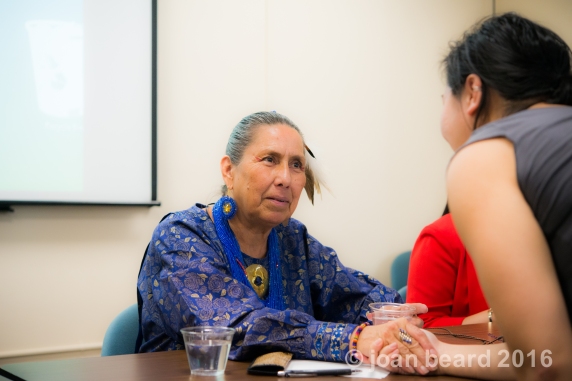
Casey Camp Horinek (Ponca Nation) speaks with allies at the start of ‘Indigenous Women of the Americas Protecting Mother Earth: Struggles and Climate Solutions’ – Photo by Joan Beard
Casey closed with reflections on the “cellular memory” and DNA of her people and all Indigenous people as fundamentally tied to the land.
“We are willing to do anything we have to do to protect our Mother, and to protect all that she provides us with.”
She held up a cup of water, “the guest of honor”, and asked why negotiators and ‘leaders’ in United Nations were not willing to sit with a cup of oil in front of them to quench their thirst as they negotiate the fate of the climate.
Casey’s last words that brought home a vital theme highlighted by all event speakers;
“We [Indigenous peoples] got your back – so what you need to do is jump on board and demand the implementation of the declaration of the Rights of Indigenous peoples, because we are going to save your ‘you know what’s’…Our issues are your issues, we really can’t separate them, and that is why we are here today… we understand the same air flows around Mother Earth, the same rain comes in the thunders and down the streams – the same breath, everything is within us and we share it all.”
Osprey of WECAN International moderated a Question and Answer session, and then closed the event with words on supporting Indigenous allies, and solidarity with the global #KeepItInTheGround and #BreakFree movement.
“Break Free from infringements on Indigenous rights
Break Free
Break Free from patriarchy
Break Free
Break Free from the commodification of Nature
Break Free
Break Free from sacrifice zones
Break Free
Break Free from colonization
Break Free
Break Free from fossil fuels
Break Free”
Special thanks to Harriet Sugarman of ClimateMama and all the amazing NYC volunteers for their tremendous support of this event.
Additional Event Photos by Joan Beard:
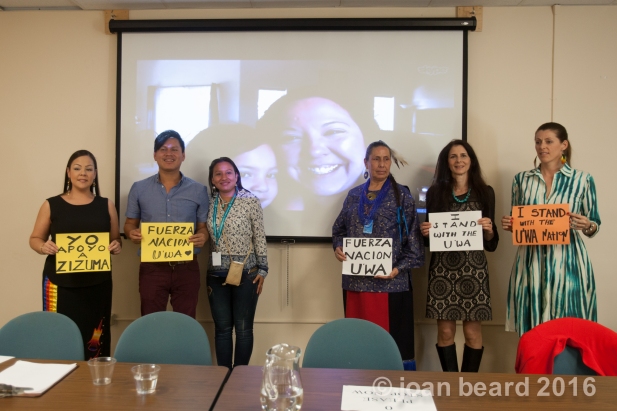
Speakers and allies stand in solidarity with the U’wa people in their efforts to protect sacred Zizuma mountain– Photo by Joan Beard

Crystal Lameman presents on tar sands extraction and Indigenous rights and community mobilization in Alberta, Canada – Photo via Harriet Shugarman

Aura Tegria Cristancho speaks on the situation of the U’wa people of Colombia. Pictured with Leo Cerda (Kichwa of Tena, Ecuador; Amazon Watch) – Photo by Joan Beard

Event attendees stand to demand immediate action to #KeepItInTheGround – Photo by Joan Beard
